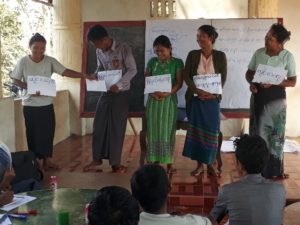
USAID’s Land Tenure Project (LTP) supported four local civil society organizations (CSOs) to lead explanatory sessions on Burma’s land legal framework for local authorities. The CSOs presented on local roles and responsibilities as stipulated by the 2012 Farmland Law; Vacant, Fallow and Virgin (VFV) Land Management Law; Community Forestry Instructions; and, Land Acquisition Act. The sessions reached nearly 500 participants across 13 village tracts where LTP had also implemented participatory mapping activities. Trainings included local authorities such as members of farmland management committees, land reinvestigation committees, village leaders, and village tract administrators.
Trainings demonstrated a high demand for knowledge of the land legal framework. A community member from Shaw Pyar Village Tract, Pathein Township, Ayeyarwaddy Region noted, “Before this project we did not even know what farmland means. We have come to know how to apply for the right to use Vacant, Fallow and Virgin Land.”
In Burma, as in many places, limited knowledge of land laws can lead to confusing expectations, land conflicts, and disputes. Increased understanding is fundamental to transparent, evidence-based decision-making, but it is often not clear or well-known by local communities and authorities, especially in remote, rural communities. With clear and accurate information on roles, responsibilities, and rights within the land legal framework, communities can identify paths to improve their land tenure security. Trainings are already producing results. Participants from Pathein Township are using their new knowledge to apply for community forestry certification and VFV land allocation, and in Yebu Village Tract, participants are planning to organize follow-on trainings to increase awareness amongst village leaders.

